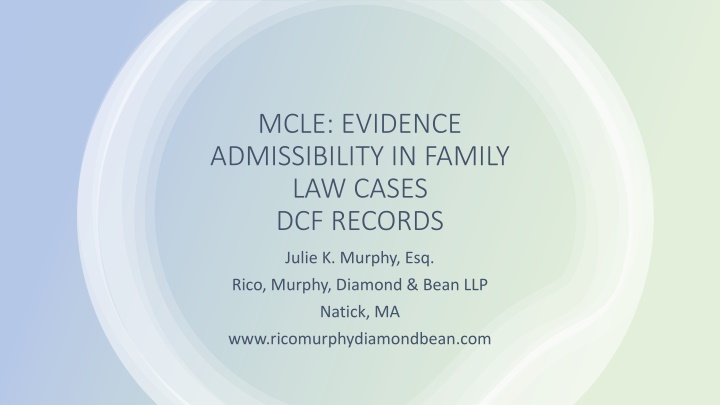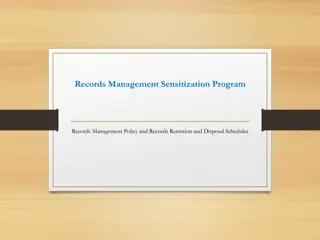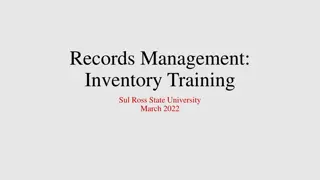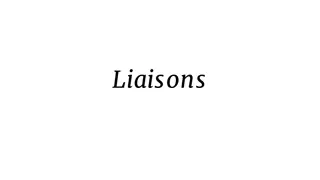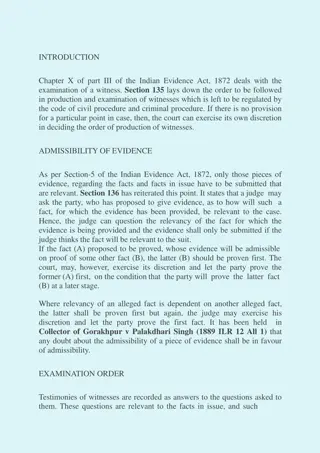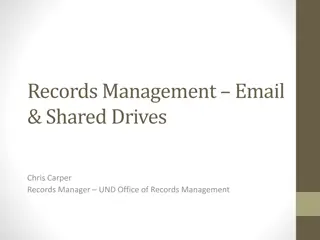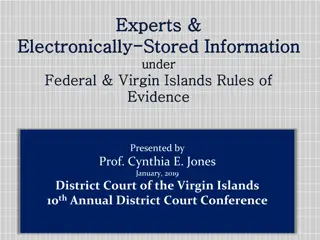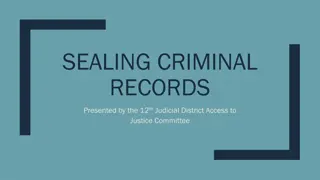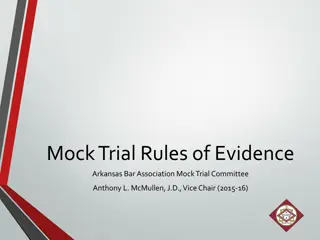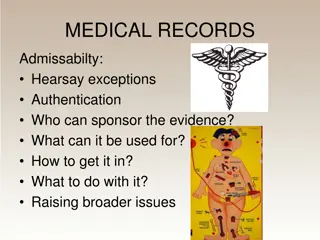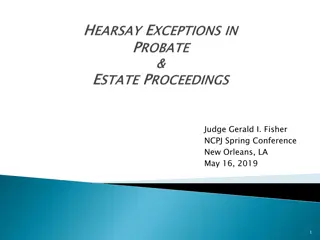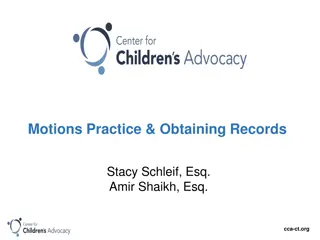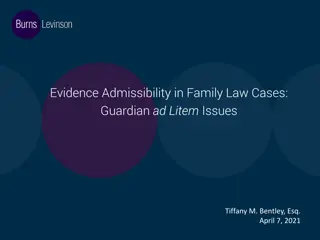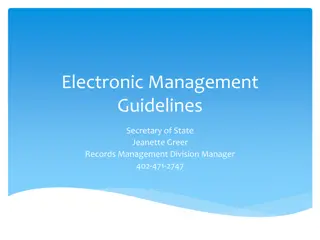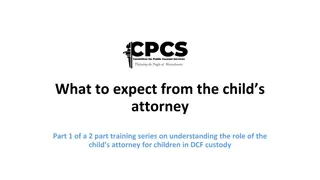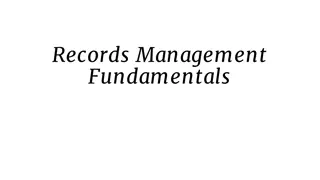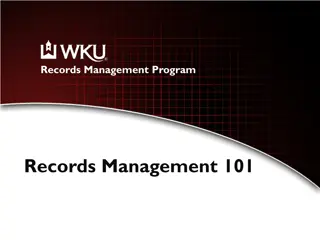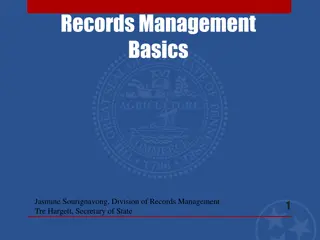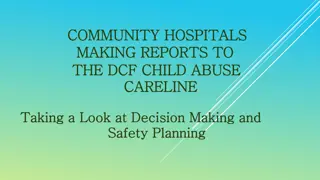Admissibility of Evidence in Family Law Cases & DCF Records
Explore the admissibility of evidence in family law cases and the handling of Department of Children and Families (DCF) records in civil proceedings. The regulations for releasing records, obtaining consent, and seeking court orders are detailed, emphasizing the importance of protecting the best interests of the child.
Download Presentation

Please find below an Image/Link to download the presentation.
The content on the website is provided AS IS for your information and personal use only. It may not be sold, licensed, or shared on other websites without obtaining consent from the author.If you encounter any issues during the download, it is possible that the publisher has removed the file from their server.
You are allowed to download the files provided on this website for personal or commercial use, subject to the condition that they are used lawfully. All files are the property of their respective owners.
The content on the website is provided AS IS for your information and personal use only. It may not be sold, licensed, or shared on other websites without obtaining consent from the author.
E N D
Presentation Transcript
MCLE: EVIDENCE ADMISSIBILITY IN FAMILY LAW CASES DCF RECORDS Julie K. Murphy, Esq. Rico, Murphy, Diamond & Bean LLP Natick, MA www.ricomurphydiamondbean.com
110 CMR 12.00 110 Mass. Reg. 12.07. Subpoena or other Legal Process The department shall not release records sought by subpoena in any civil proceeding until it has made reasonable efforts to notify each subject in the records, so that person, has reasonable time to seek to have the process squashed, in accordance with M.G.L c.66a 2(k). M.G.L. c.66a 2(k): maintain procedures to ensure that no personal data is made available in response to a demand for data made by means of compulsory legal process, unless the data subject has been notified of such demand in reasonable time that he [she, they] may seek to have the process quashed . If the Department cannot reach an individual, they shall note it in the case record and release the file. In the alternative, the Department may elect to bring the entire unredacted file, without prior notification to parties, for an in-camera review before a Judge. If the records are ordered released by the Judge, then the Department shall notify the parties.
Release of 51A and 51B Forms M.G.L. c. 119, 51E Governs Release of 51A Reports and 51B Investigations -See 110 Mass.Reg.12.08-Release of 51a and 51B Forms. Reports are Confidential. Upon request and with the approval of the commissioner, copies of written reports of initial investigations may be provided to: (i) the child's parent, guardian, or counsel, (ii) the reporting person or agency, (iii) the appropriate review board, (iv) a child welfare agency of another state for the purpose of assisting that agency in determining whether to approve a prospective foster or adoptive parent, or (v) a social worker assigned to the case. No such report shall be made available to any persons other than those specified in this section without the written and informed consent of the child's parent or guardian, the written approval of the commissioner, or an order of a court of competent jurisdiction.
110 CMR 12.08 Release of 51A and 51B Forms 51A Reports and 51B Investigations are governed by M.G.L. c. 119, 51E. The records will be made available only if one of the following is obtained: Written consent of the child s parents (father as defined by M.G.L. c.209C 6), guardians or counsel. Regardless of whether parental or guardian consent is obtained, the Commissioner or his/her designee shall have the discretionary authority to grant or deny the request in order to promote and protect the best interests of the child. The written approval of the Commissioner or his/her designee. An order of a court of competent jurisdiction. A "court of competent jurisdiction" may include an out- of-state (non-Massachusetts) court, or a military court, so long as that court has some form of jurisdiction over the subject matter or the part(ies).
REQUESTS FOR THE RECORDS All requests for 51A reports/51B investigations should be in writing or by telephone, and should be directed to the Regional Director, as the Commissioner's designee. Letter requests (but not telephone requests) will be accepted if made by an attorney on behalf of their client, as long as the attorney's request letter specifically states that the attorney is authorized to act on behalf of the client and is accompanied by a release or authorization signed by the client. Regional Director, or their designee, requests from the Area Director of his/her designee, a copy of the 51A report and 51B investigation, together with a recommendation from the Area Director or his/her designee as to whether granting the request of the requesting party would be contrary to the child's best interests. The Area Director sends a copy of the 51A report and 51B investigation, together with his/her recommendation, to the Regional Director. Upon receipt of the 51A report, 51B investigation, and recommendation from the Area Director or his/her designee, the Regional Director or his/her designee decides whether to release all or portions of the information based upon an analysis of whether such release to the requesting party would be contrary to the child's best interests. Upon a decision to grant all or part of the request, the material will be made available to the requesting party from the Regional Office within 30 calendar days of the initial request (or 45 calendar days if the requested material is voluminous).
All others (not the attorney) can appear in person to request the records. Identification is required. A request may be made by mail however identification must be shown in advance. If the request is denied, the Regional Director shall send written notice of the denial stating the reason. A denial is not grounds for a fair hearing. A non-custodial parent shall have the same right to access as a custodial parent. Whenever documents are released, the name of the reporter shall be redacted. REQUESTS FOR THE RECORDS CONTINUED
Probate & Family Court Standing Order 2-11 1. Whenever the Probate and Family Court determines that it requires information from the Department of Children and Families (DCF) in order to make a determination relating to the care and custody of a child, the Court shall either obtain the written, informed consent of the party(ies), after identifying the documents requested on the form entitled Consent and/or Order for Production of Department of Children and Families Documents , and/or issue an order identifying the documents to be produced. Such orders may, in the judge s sound discretion, be made under G. L. c. 119, 51E and 51F, or any other applicable provision of law. Any written, informed consent and/or order shall be docketed. Parties may request a hearing on the issue of the need for DCF documents. 2. Circumstances where documents may be requested include, but are not limited to, where (a) a party s Affidavit Disclosing Care or Custody Proceedings (Trial Court Uniform Rule IV) or other filing reveals a pending child welfare case; (b) a Probation or guardian ad litem report reveals a party s past or pending child welfare case, past or present DCF involvement, or history of child abuse or neglect; (c) witness testimony reveals a party s past or pending child welfare case, past or present DCF involvement, or history of child abuse or neglect; or (d) a party discloses his or her own, or alleges another party s, past or pending child welfare case, past or present DCF involvement, or history of child abuse or neglect. 3. The Court shall provide DCF with a copy of the written, informed consent or order, which identifies the requested documents. 4. The parties and counsel shall be given the opportunity to review all documents obtained from DCF prior to the hearing and be provided with an adequate and meaningful opportunity to respond. Upon the request of counsel or a party for additional time to rebut or respond to the DCF documents, the matter may be continued for up to 7 days for hearing. Leave to continue shall be freely granted. The Court shall enter an order if necessary, to protect the interests of the child or children prior to the continued hearing. At the hearing, the DCF documents shall be available to the Court and to the parties and shall be admissible in accordance with applicable rules of evidence. 5. Upon its own initiative, or upon the request of any party, or upon the request of DCF, the Court may issue an order allowing a representative of DCF to present oral testimony at a hearing or trial by electronic means. The phrase electronic means shall include communication by telephone, video teleconference, or the Internet. Testimony presented by electronic means shall be admissible in accordance with the applicable rules of evidence. 6. The Court shall afford a party the opportunity to object to and rebut information about the party that appears in the DCF documents and otherwise to respond to the DCF documents or information presented in person by DCF.
7. Parties and counsel shall have the right to view the DCF documents as often as they wish, upon reasonable request. Handwritten notes may be taken, however, no electronic reproductions shall be allowed. This restriction includes, but is not limited to, scanning and photography, by mobile device or otherwise. 8. Unless otherwise ordered by the court, the attorney(s) of record, if both parties are represented by counsel, shall be entitled to copies of the DCF documents. In the event only one party, or neither party, is represented by counsel and a party wishes to obtain a copy of the DCF documents, the party or his/her attorney must file a motion with the Court. Service of the motion and the time periods for hearing shall be in accordance with the Massachusetts Rules of Domestic Relations Procedure, or the Massachusetts Rules of Civil Procedure, as applicable. 9. In order to protect the privacy of the parties and the children involved, all documents received from DCF will be segregated by the Court and will be made available to the parties, counsel and any other individual who would otherwise be authorized to have access to such information, who shall treat such information as confidential. Any individual who views DCF documents, including counsel, is prohibited from disclosing an impounded address or using information in the DCF documents except as allowed by order of the Court. Any DCF documents produced pursuant to the procedures set forth in this Standing Order will be maintained in the Probation Department of each division of the Probate and Family Court. In the event DCF records are subpoenaed for trial or evidentiary hearing, the records shall be kept in the Registry of Probate, in the customary manner. STANDING ORDER 2-11 CONTINUED 10. This Standing Order shall be construed to authorize a judge to issue such order or additional orders or rulings as are necessary and appropriate under the circumstances and consistent with due process. 11. Once the Court has placed a child with DCF pursuant to G. L. c. 119, 23(a)(3), the provisions of this Standing Order no longer apply and the protections and procedures of Chapter 119 apply.
Mass Gen. Laws 119 51E Reports of Injured Children, Files, Confidentiality, Penalties Section 51E. The department shall maintain a file of the written reports prepared under this section and sections 51A to 51D, inclusive. These written reports shall be confidential. Upon request and with the approval of the commissioner, copies of written reports of initial investigations may be provided to: (i) the child's parent, guardian, or counsel, (ii) the reporting person or agency, (iii) the appropriate review board, (iv) a child welfare agency of another state for the purpose of assisting that agency in determining whether to approve a prospective foster or adoptive parent, or (v) a social worker assigned to the case. No such report shall be made available to any persons other than those specified in this section without the written and informed consent of the child's parent or guardian, the written approval of the commissioner, or an order of a court of competent jurisdiction. Pursuant to chapter 18C, the child s advocate shall have access to these reports. A child welfare agency of another state may, upon request, and upon the approval of the commissioner, receive a copy of the written report of the initial investigation if the agency has a need for such information in order to carry out its responsibilities under law to protect children from abuse and neglect. The name and all other identifying information relating to any child, or to his or her parents or guardian, shall be removed from said reports 1 year after the department determines that the allegation of serious physical or emotional injury resulting from abuse or neglect cannot be substantiated, or, if said allegations are substantiated, when the child reaches the age of 18, or 1 year after the date of termination of services to the child or his or her family, whichever date occurs last; provided, however, that the department may retain information on unsubstantiated reports to assist in future risk and safety assessments of children and families and may release said information to the child welfare agencies of other states upon request of said child welfare agency for the purpose of assisting said child welfare agency in determining whether to approve a prospective foster or adoptive parent. Any person who permits any information in the files to be released to persons other than those specified in this section shall be punished by a fine of not more than $1,000 or by imprisonment for not more than 21/2 years, or both.
DCF AT MOTION HEARING
DCF AT TRIAL JUDGE S INPUT Does counsel have to agree the records are coming in? Does the Judge enter reports as a court record? How does the Judge address hearsay? Does the Judge want DCF there? Does the Judge give records ahead of time? What does the Judge want to hear from DCF?
DCF POINT OF VIEW INTERVIEW WITH A FORMER CASE WORKER 1. DCF record requests are made to the area director. 2. Requests for cases that are involved with the Special Investigations Unit (SIU) or Critical Incident Unit (CIU) would be made to the Regional Director. 3. By policy, physical case records are not suppose to leave the area office. 4. DCF testimony is presented in a neural and factual manner. 5. A parent s strengths and weaknesses can be discussed. 6. Case workers can discuss DCF recommendations and Action Plans. 7. DCF is not suppose to discuss specifics of a parent s substance abuse or criminal record. 8. Absent a GAL specifically assigned to assess a waiver, DCF is no suppose to testify about privileged information a child has shared with a therapist. A child s treatment plan can be discussed. 9. DCF does not provide opinions on custody placement. If DCF believes a child is in imminent risk living with a parent they would seek to remove them. 10. Probation often acts as the intermediary and informs DCF of the information the Judge is requesting.
DCF POINT OF VIEW CONTINUED When DCF testifies, they typically only testify to the time they were assigned to the case and not the case record they reviewed. Note: a case record, when reviewed in chunks may not provide the whole picture of a case or a parent s strengths and weaknesses. Having the case workers testify can provide the Judge a more accurate picture. Example from this caseworker: a Probate Judge was presented only with 51A and 51B reports and awarded temporary custody to Parent A. The Court was not aware of Parent A s domestic violence with several partners, attendance at a mandated DV program in his current relationship, and said program identified that he used the probate court as a way to continue to abuse Parent B.DCF was able to testify and bring the whole picture to the Court.
